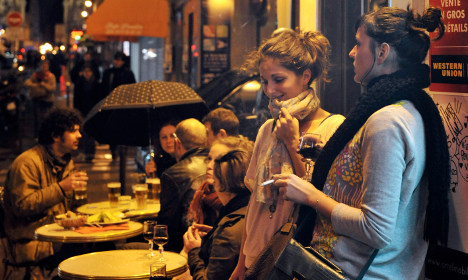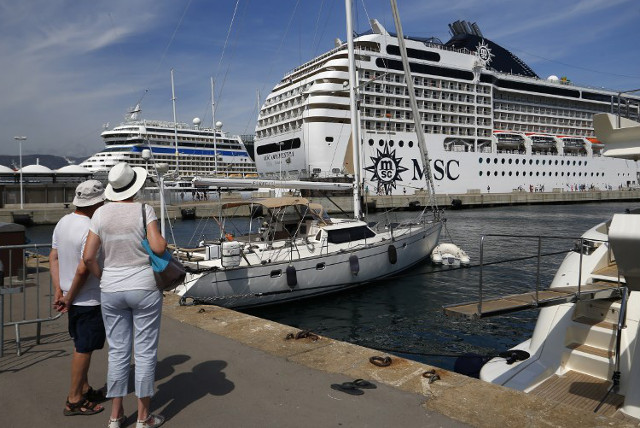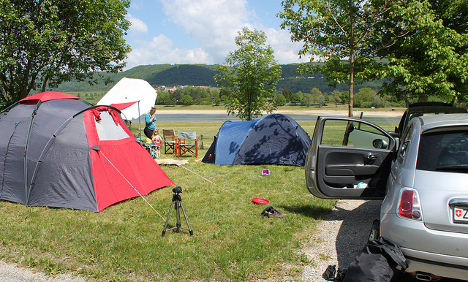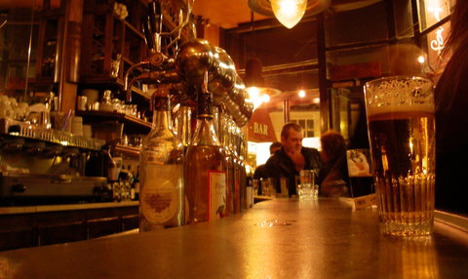How to find the right summer job in France

For decades, the working summer in France has been an unforgettable expat ritual. But whether pulling pints, working with kids at a campsite, or picking grapes in the great outdoors, there are some perks and pitfalls to watch out for.
With temperatures soaring and families leaving cities en masse and heading for the beach, the summer season is well and truly upon us here in France.
Which, for thousands from Britain, Ireland, the US and beyond, means an unforgettable few months working in kids’ camps, on beaches, and in bars and restaurants all over France.
Whether you’re starting a gap year, looking for adventure before heading back to university, or on a career break, there are perks and pitfalls to look out for.
Luckily, The Local has assembled this brief guide to finding the right summer job in France.
1. The basics
If you’re a citizen of an EU country, you are free to live and work in France for as long or short a period of time as you like - so for the Brits out there, it might be best to take advantage of this while you can!
If not, you are by law required to get some form of work permit, though many summer visitors work off the books during their permitted 90-day maximum stay, designed for tourism, which doesn’t require a visa, but is illegal.
France’s minimum hourly wage, known as SMIC, is €9.76 as of 2017 and it applies to you just as much as to any French worker.
READ ALSO:
-
Are you an English speaker in France? Here are some job options you may not have considered
-
Ten tips for writing the perfect French CV
-
Top Tips: Working as a tour guide in France

If you’re getting a temporary contract (CDD), anything over 35 hours a week is overtime, and you can’t be forced to work more than 10-12 hours a day, depending on the industry.
Some of your rights as a worker will be governed by the collective agreements (union rights) of your profession, so take the time to get informed, in case of any difficulties with employers.
You might be entitled to universal health coverage, but this can depend on how long your contract is for.
CHECK HERE for more details (in English) on your rights and obligations as a foreign worker in France.
2. Watch out for unscrupulous bosses.
Two particularly rough-and-ready sources of summer work are the farming and wine sectors.
Picking grapes and other fruit can be a great way to work on your tan and spend your days in the great French outdoors, and what’s required of you isn’t particularly complicated.
Many agricultural jobs don’t come with contracts, however. If you’re allergic to paperwork, and you like cash in your hand at the end of the week, this might work for you, and of course under-the-table work is not limited to these industries.

But if you don’t have a proper employment contract, you could be leaving yourself open to nasty bosses who have a tendency to pay you less than legally required, and force you to work more hours than they’re legally allowed to.
In fact, for this very reason, viticultural employers have in recent years been hiring less and less English-speaking students, and more Eastern European labourers, Mick Briggs, managing director of Season Workers tells The Local.
However, if you want to get your fingers dirty, but you value your own labour, CLICK HERE for
3. Try going offshore
Another attractive possibility for those looking for a bit of summer adventure in France is working on luxury yachts, particularly off the Mediterranean Côte d’Azur.
Deck crew, mechanics, chefs and hospitality staff can make particularly good money working on ‘superyachts’ off the coast of Cannes, Antibes and St. Tropez, and a summer job is often a gateway into a satisfying and lucrative career in the field.
 AFP
AFP
4. Campsites
Working on a campsite has for years been a very popular way for expats to spend the summer months in France, but there are a couple of points to watch out for, says Mick Briggs.
There are advantages to working for British-registered companies, such as avoiding the complications and paperwork of getting a contract with a French one, and not having to pay French national insurance.
However, UK camping firms often themselves insist that their workers have a British national insurance number, although for citizens of other EU countries, this isn’t as difficult as it might seem.
“I would strongly recommend not just showing up in France and walking into campsites looking for work,” says Briggs.
“The best thing to do is get in touch with a few companies in advance, and sort out a job before you go over there,” he adds.
Here are a few: http://www.campotel.com/, http://www.canvasholidays.co.uk/, http://www.vacansoleil.com/, http://www.siblu.com/, http://www.eurocamp.co.uk/
 A campsite in Ain, central France. Photo: Victor Engmark/Flickr
A campsite in Ain, central France. Photo: Victor Engmark/Flickr
5. Pubs and hospitality
Working as a server or chef in a French brasserie might seem like a summer plucked straight from a movie, but be aware that your level of French will need to be particularly high, to remember orders, recite wine lists, and placate occasionally grumpy diners.
If you’re French isn’t quite up to scratch, it might be worth taking the time to work as a dishwasher while you improve your language skills.
In any case, if you have hospitality experience, and you’d like to ply your trade in France for the summer, check out this top-level recruitment agency.
 Photo: Fabrizio Morrola/Flickr
Photo: Fabrizio Morrola/Flickr
A more likely option might be to find a job at an expat bar, and while this is a popular avenue, it comes with its own pitfalls.
Outside the larger French cities, your best chance of getting a gig behind the bar at an Irish or Australian pub will be at summer resorts popular with expats.
In a city like Paris, however, which isn’t as dependent on summer tourism, managers might be reluctant to hire someone they know won’t be around beyond September, so be prepared to apply wherever you can, and don’t be too fussy about where you end up working.
Browse thousands of English-language jobs in France
Comments
See Also
With temperatures soaring and families leaving cities en masse and heading for the beach, the summer season is well and truly upon us here in France.
Which, for thousands from Britain, Ireland, the US and beyond, means an unforgettable few months working in kids’ camps, on beaches, and in bars and restaurants all over France.
Whether you’re starting a gap year, looking for adventure before heading back to university, or on a career break, there are perks and pitfalls to look out for.
Luckily, The Local has assembled this brief guide to finding the right summer job in France.
1. The basics
If you’re a citizen of an EU country, you are free to live and work in France for as long or short a period of time as you like - so for the Brits out there, it might be best to take advantage of this while you can!
If not, you are by law required to get some form of work permit, though many summer visitors work off the books during their permitted 90-day maximum stay, designed for tourism, which doesn’t require a visa, but is illegal.
France’s minimum hourly wage, known as SMIC, is €9.76 as of 2017 and it applies to you just as much as to any French worker.
READ ALSO:
- Are you an English speaker in France? Here are some job options you may not have considered
- Ten tips for writing the perfect French CV
- Top Tips: Working as a tour guide in France

If you’re getting a temporary contract (CDD), anything over 35 hours a week is overtime, and you can’t be forced to work more than 10-12 hours a day, depending on the industry.
Some of your rights as a worker will be governed by the collective agreements (union rights) of your profession, so take the time to get informed, in case of any difficulties with employers.
You might be entitled to universal health coverage, but this can depend on how long your contract is for.
CHECK HERE for more details (in English) on your rights and obligations as a foreign worker in France.
2. Watch out for unscrupulous bosses.
Two particularly rough-and-ready sources of summer work are the farming and wine sectors.
Picking grapes and other fruit can be a great way to work on your tan and spend your days in the great French outdoors, and what’s required of you isn’t particularly complicated.
Many agricultural jobs don’t come with contracts, however. If you’re allergic to paperwork, and you like cash in your hand at the end of the week, this might work for you, and of course under-the-table work is not limited to these industries.

But if you don’t have a proper employment contract, you could be leaving yourself open to nasty bosses who have a tendency to pay you less than legally required, and force you to work more hours than they’re legally allowed to.
In fact, for this very reason, viticultural employers have in recent years been hiring less and less English-speaking students, and more Eastern European labourers, Mick Briggs, managing director of Season Workers tells The Local.
However, if you want to get your fingers dirty, but you value your own labour, CLICK HERE for
3. Try going offshore
Another attractive possibility for those looking for a bit of summer adventure in France is working on luxury yachts, particularly off the Mediterranean Côte d’Azur.
Deck crew, mechanics, chefs and hospitality staff can make particularly good money working on ‘superyachts’ off the coast of Cannes, Antibes and St. Tropez, and a summer job is often a gateway into a satisfying and lucrative career in the field.
 AFP
AFP
4. Campsites
Working on a campsite has for years been a very popular way for expats to spend the summer months in France, but there are a couple of points to watch out for, says Mick Briggs.
There are advantages to working for British-registered companies, such as avoiding the complications and paperwork of getting a contract with a French one, and not having to pay French national insurance.
However, UK camping firms often themselves insist that their workers have a British national insurance number, although for citizens of other EU countries, this isn’t as difficult as it might seem.
“I would strongly recommend not just showing up in France and walking into campsites looking for work,” says Briggs.
“The best thing to do is get in touch with a few companies in advance, and sort out a job before you go over there,” he adds.
Here are a few: http://www.campotel.com/, http://www.canvasholidays.co.uk/, http://www.vacansoleil.com/, http://www.siblu.com/, http://www.eurocamp.co.uk/
 A campsite in Ain, central France. Photo: Victor Engmark/Flickr
A campsite in Ain, central France. Photo: Victor Engmark/Flickr
5. Pubs and hospitality
Working as a server or chef in a French brasserie might seem like a summer plucked straight from a movie, but be aware that your level of French will need to be particularly high, to remember orders, recite wine lists, and placate occasionally grumpy diners.
If you’re French isn’t quite up to scratch, it might be worth taking the time to work as a dishwasher while you improve your language skills.
In any case, if you have hospitality experience, and you’d like to ply your trade in France for the summer, check out this top-level recruitment agency.
 Photo: Fabrizio Morrola/Flickr
Photo: Fabrizio Morrola/Flickr
Outside the larger French cities, your best chance of getting a gig behind the bar at an Irish or Australian pub will be at summer resorts popular with expats.
In a city like Paris, however, which isn’t as dependent on summer tourism, managers might be reluctant to hire someone they know won’t be around beyond September, so be prepared to apply wherever you can, and don’t be too fussy about where you end up working.
Browse thousands of English-language jobs in France
Join the conversation in our comments section below. Share your own views and experience and if you have a question or suggestion for our journalists then email us at [email protected].
Please keep comments civil, constructive and on topic – and make sure to read our terms of use before getting involved.
Please log in here to leave a comment.